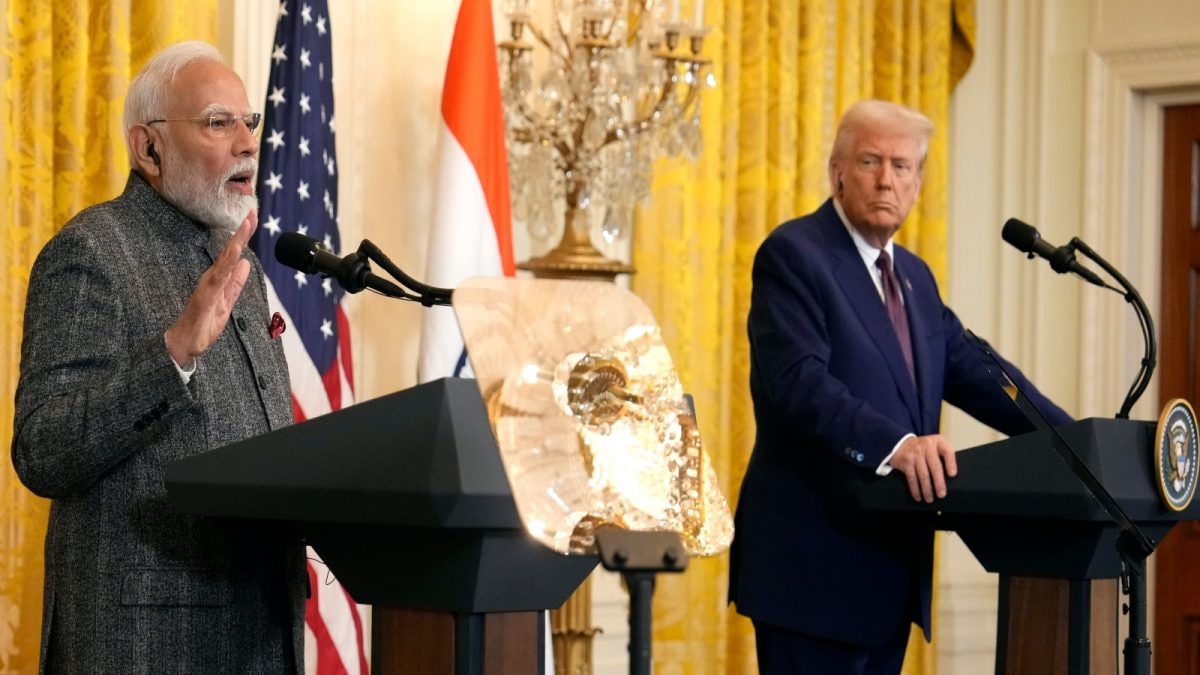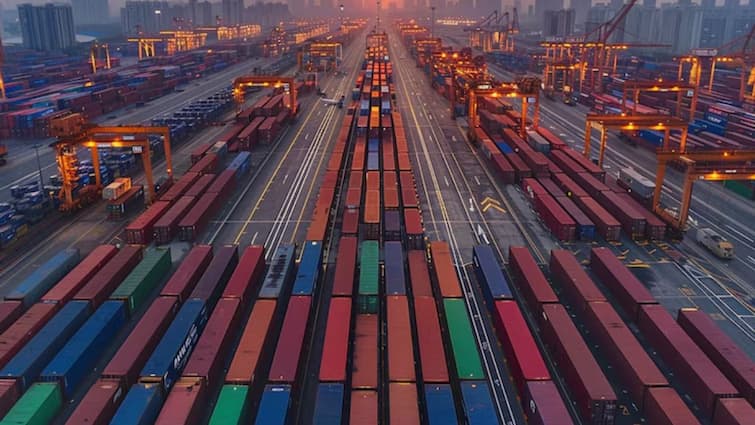Last Updated:
Scrapping the 2% levy could appease Washington, easing trade tensions and securing access to US tech partnerships in AI and semiconductors. But it would cost billions in revenue

As a tech hub, India needs US collaboration—chip manufacturing and cloud infrastructure. But it is also wary of over-dependence. (AP File Photo)
Bengaluru’s buzzing tech parks and thriving start-up hubs tell the story of a nation in digital overdrive. India, once known as the world’s back office, is now a global technology powerhouse with its digital economy—currently worth $300 billion—on track to touch $1 trillion by 2025. Cheap data, a young talent pool, and ambitious policies like Digital India have powered this transformation, positioning India as a serious challenger to Silicon Valley’s dominance.
Recommended Stories
But this rapid rise has sparked friction with Washington. At the centre of the dispute: India’s digital taxes on foreign tech giants and the US threat of retaliatory tariffs.
Will New Delhi bow to trade pressure or defend its right to tax global firms? The choice could shape not just India’s digital future but also the rules of global trade in the digital era.
The Rise Of India’s Digital Economy
India’s digital economy grew 2.4 times faster than the overall economy between 2014 and 2019, and created over 62 million jobs. It is now a cornerstone of the nation’s $5 trillion growth target by 2027.
With nearly 900 million Internet users, India is powered by one of the world’s cheapest data rates. The Unified Payments Interface (UPI) processes billions of transactions monthly, making cashless payments a way of life. E-commerce platforms like Flipkart have transformed shopping, while fintech start-ups are banking the unbanked, from rural farmers to urban gig workers.
Government initiatives have been pivotal. Digital India, launched in 2015, wired villages and digitized services, while Make in India lured foreign investment into tech and manufacturing. As a result, the digital sector grew and reshaped how India works, shops, and learns. Yet challenges loom: Gaps in AI readiness and digital inclusion demand more investment in skills and infrastructure to sustain the momentum.
How India Performed As A Global Tech Hub
India’s tech prowess is undeniable. Six cities—Bengaluru, Hyderabad, Delhi-NCR, Mumbai, Pune, and Chennai—rank among Asia-Pacific’s top tech talent hubs. Bengaluru, dubbed India’s Silicon Valley, is a global leader in AI talent, venture capital, and tech infrastructure. The country churns out millions of STEM graduates annually, drawing giants like Google and Microsoft to set up R&D hubs. From IT services to cutting-edge product development, India’s tech ecosystem is evolving fast.
The numbers tell the story. India is among the top three tech markets globally, alongside China and Japan. Two-thirds of Indian firms are diversifying talent for AI and digital roles, positioning the country as a magnet for innovation. Global corporations are flocking to establish operational hubs, leveraging India’s cost advantage and skilled workforce.
Start-ups are going global too, with Indian tech backing US ventures raising millions. This shift from offshore coding to innovation leadership has analysts calling India the “new global tech hub.”
What Is The Digital Tax?
At the heart of the US-India spat is the Digital Services Tax (DST), known in India as the Equalisation Levy. Introduced in 2016, the Equalisation Levy started as a 6% tax on online advertising revenue earned by non-resident tech firms. In 2020, it expanded to include a 2% levy on e-commerce and digital services—think streaming platforms, cloud services, and app stores. Targeting companies with over Rs 20 crore in Indian revenue, it is a tax on gross earnings, not profits, ensuring foreign giants like Amazon, Google, and Meta contribute to India’s coffers.
Why the levy? Global tax rules, designed for brick-and-mortar businesses, let digital firms exploit loopholes, paying little tax despite massive local profits. India’s DST aims to level the playing field, capturing revenue from firms with no physical presence but huge user bases. It is part of a global trend: Countries like France and the UK have similar taxes, though India’s broad scope, covering all digital transactions, is unique.
The levy aligns with the OECD’s push for a multilateral tax framework. Pillar 1 reallocates taxing rights on multinationals’ excess profits (25% above a 10% margin for firms with €20 billion+ revenue), while Pillar 2 sets a 15% global minimum tax. India backs this but insists on treating both pillars as a package, wary of rushed commitments that favour richer nations.
What Is The US-India Tax Clash?
The US sees India’s DST as a jab at American tech giants. Washington argues it discriminates against firms like Apple and Netflix, violating fair trade principles. In 2021, the US threatened retaliatory tariffs under Section 301 but paused them for OECD talks. India made a concession in March 2025, scrapping the 6% ad tax, a move hailed as a step toward fairness. But the 2% levy remains, and tensions have spiked.
As of August 2025, US trade rhetoric has hardened. With threats of tariffs and export curbs, the US claims India’s tax unfairly targets its firms, costing billions. These threats dovetail with broader trade frictions, including US tariffs on Indian goods tied to India’s Russian oil imports.
India’s response is steely: The levy is a sovereign right to tax profits earned from its market. Officials have signalled readiness to negotiate but reject one-sided demands, stressing fiscal autonomy and OECD alignment.
India Faces A High-Stakes Choice
Scrapping the 2% levy could appease Washington, easing trade tensions and securing access to US tech partnerships in AI and semiconductors—critical for India’s ambitions. But it would cost billions in revenue, vital for infrastructure and social programmes. The levy generated significant sums in 2024, and losing it could strain public finances, especially as India pushes for digital inclusion.
Defending the tax, however, risks US tariffs on $150 billion in Indian exports, from textiles to pharma. With global trade talks stalled and US-China tensions looming, India’s balancing act is tricky. New Delhi has signalled it may phase out the levy once OECD’s Pillar 1 is fully implemented, expected by mid-2026, but only if the framework ensures fair revenue sharing. Until then, India’s stance is clear: It won’t bow to pressure.
India’s Strategic Calculus
New Delhi’s position reflects its broader geopolitical strategy. As a tech hub, India needs US collaboration—think chip manufacturing and cloud infrastructure. But it is also wary of over-dependence. Strengthening domestic tech, from 5G to AI, is a priority, with policies like the Production Linked Incentive (PLI) scheme boosting local manufacturing. Aligning with the OECD offers a long-term solution, but India insists on terms that protect emerging economies.
The government’s rhetoric is defiant yet pragmatic. Leaders have vowed to safeguard farmers and small businesses from tariff fallout while pushing self-reliance. Bilateral talks with the US continue, but trust is thin after cancelled trade visits and escalating rhetoric. India’s tech giants, meanwhile, are watching closely, as US restrictions could limit access to cutting-edge tools.
What Lies Ahead?
India’s digital economy is a global force, but the tax dispute tests its resolve. Holding the line risks short-term pain but burnishes India’s image as a sovereign player. Caving to US demands could smooth trade but weaken fiscal control.
As New Delhi navigates this tightrope, its tech hub status hangs in the balance. With OECD talks progressing and domestic innovation soaring, India’s digital dream is resilient, but the next few months will decide how brightly it shines.
About the Author

Shilpy Bisht, Deputy News Editor at News18, writes and edits national, world and business stories. She started off as a print journalist, and then transitioned to online, in her 12 years of experience. Her prev…Read More
Shilpy Bisht, Deputy News Editor at News18, writes and edits national, world and business stories. She started off as a print journalist, and then transitioned to online, in her 12 years of experience. Her prev… Read More
Loading comments…
Scan the QR code to download the News18 app and enjoy a seamless news experience anytime, anywhere





